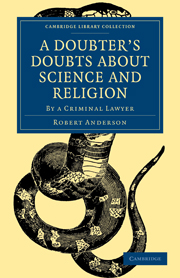Summary
The hypothesis of degeneration has been here suggested as a rival to that of evolution. It equally accounts for the facts, and is less beset with difficulties. Are we, then, to accept it? By no means. Both alike are mere theories, wholly unsupported by direct evidence; and therefore the sceptic will reject both, unless they be alternatives, and he is thus compelled to make choice between them. But they are not alternatives. The facts submitted to our notice by the naturalist would be still more fully accounted for by the assumption that every kind of creature sprang from the same Creator's hand.
And this is, in fact, the only alternative which the evolutionist admits. “We have to choose between two hypotheses,” he tells us—“the hypothesis of special creations, and the hypothesis of evolution.” The necessity for this admission, be it observed, is by implication a conclusive proof that evolution is unproved.
Let us, then, consider the suggested alternative. Mr. Herbert Spencer will tell us that, “however regarded, the hypothesis of special creations turns out to be worthless — worthless by its derivation; worthless in its intrinsic incoherence; worthless as absolutely without evidence; worthless as not supplying an intellectual need; worthless as not satisfying a moral want. We must, therefore,” he concludes, “consider it as counting for nothing in opposition to any other hypothesis respecting the origin of organic beings.”
- Type
- Chapter
- Information
- A Doubter's Doubts about Science and ReligionBy a Criminal Lawyer, pp. 38 - 52Publisher: Cambridge University PressPrint publication year: 2009First published in: 1889

